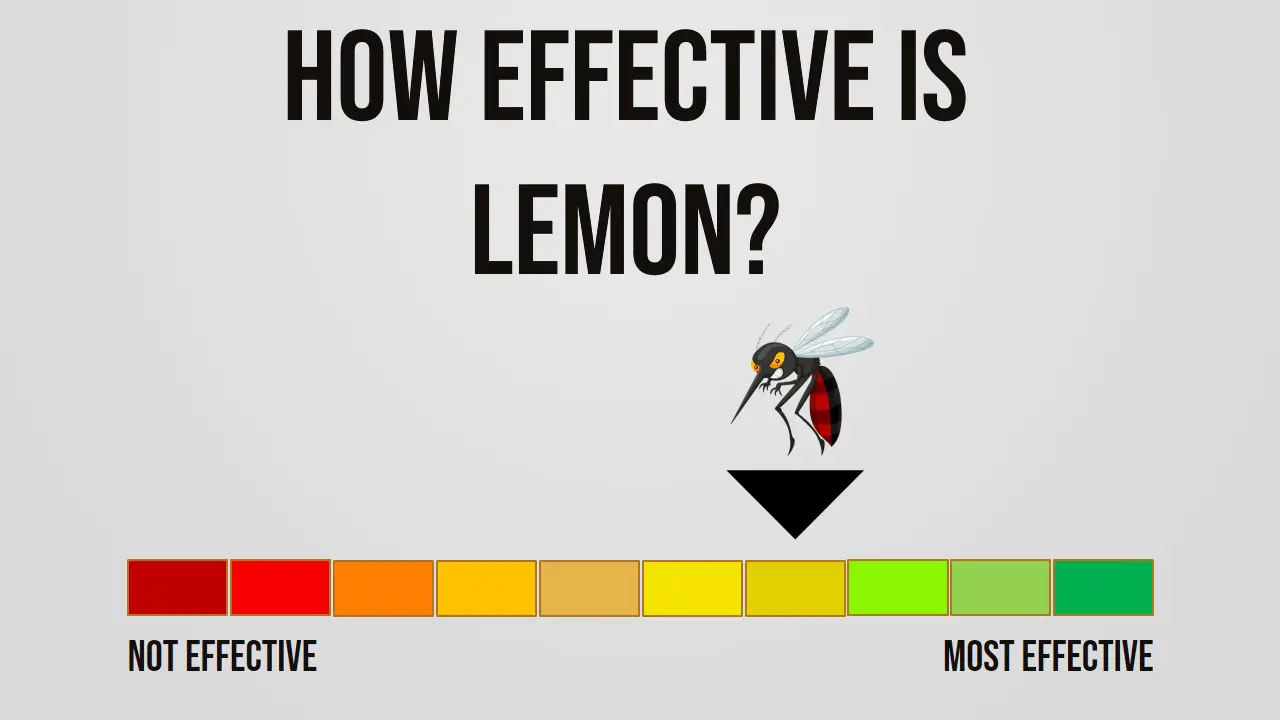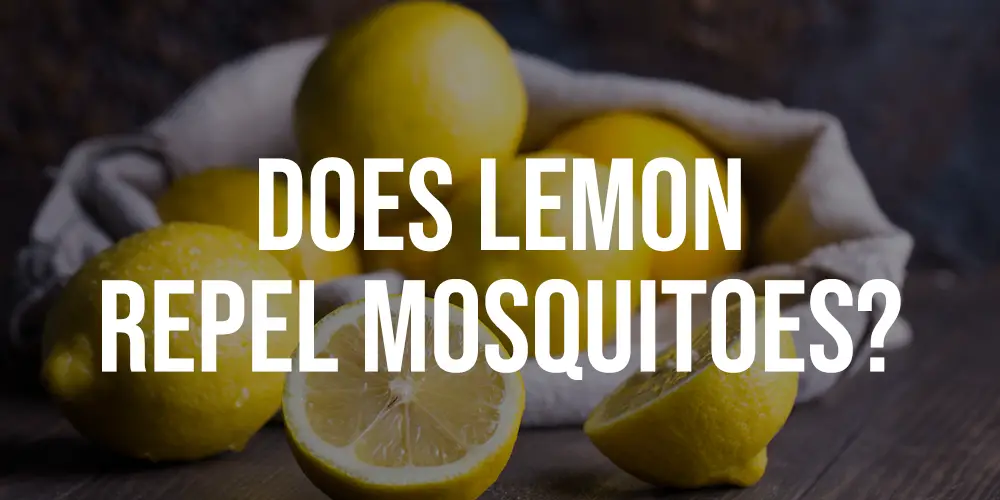Lemon is a citrus fruit that contains a high amount of citric acid. This acidic ingredient is assumed to be an effective repellent against mosquitoes and other insects that bite or sting.
The assumption is that the strong smell of lemon will deter the insects from coming near it, thus providing protection from mosquito bites.
Parasitology Research published an original journal article study by Abdelkrim Amer and Heinz Melhorn that show lemon oils to not be found among the top most effective plant extracts to repel mosquitoes. (1) Other than this study lemon as a mosquito repellent research is lacking.
In our research, we have found some online sources to claim that studies have shown that applying lemon oil topically can help keep mosquitoes and other insects at bay.
However, the effectiveness of lemon as a mosquito repellent is unjustifiable with the study datum found in peer-reviewed journals. The person seeking to be protected from mosquito bites should seem other natural repellents than lemons.

Navigation
Does Lemon Juice Repel Mosquitoes?
Lemon juice is acidic and has a strong smell, two properties that in and of themselves can help repel mosquitoes. However, the effectiveness of lemon juice as a repellent is at the low end of effectiveness and a combination of more effective natural oils ought to be used.
While seeking a natural mosquito repellent to avoid bites it is important to choose a strong repellent based on where you are traveling. In countries that have Zika or Malaria, the choice of mosquito repellent becomes increasingly important.
According to the CDC there is no current local transmission of the Zika virus in the continental United States. (2) If the goal is to protect the skin protected against Aedes aegypti mosquitoes, the type of mosquito that can transmit Zika virus, choose a strong repellent.
Lemon juice on its own is not effective at repelling Anopheles gambiae mosquitoes, the type of mosquito that can transmit malaria. Thus it is imperative to use an alternative to lemon juice to truly repel mosquitoes.
How Do Lemons Get Rid of Mosquitoes?
Well, as stated above lemons do not get rid of mosquitoes. This is contrary to the opinion and assertion that, lemons are effective at repelling mosquitoes due to their strong smell and acidic properties.
To use lemon as a repellent, apply fresh lemon juice to exposed skin or clothing, or add lemon juice to a spray bottle and use it to mist your skin and clothing. You can also rub the cut side of a fresh lemon on your skin or crush a few lemons in a bowl and leave them by open windows as an extra deterrent against mosquitoes.
While lemons are effective at repelling mosquitoes, they may not be the best option if you have sensitive skin. If you have any concerns, speak to your doctor before using lemon juice on your skin.
Can Lemons Kill Mosquitoes?
Lemons cannot kill mosquitoes but their acidic properties can help to control the population. When applied to standing water, lemon juice can help to kill larvae and eggs. This can help to reduce the number of mosquitoes in an area.
To use lemon as a mosquito control measure, add fresh lemon juice to standing water or add lemon slices to a bowl of water. The acidity in the lemon will kill mosquito larvae and eggs, reducing the population in the area.
Do Lemons Attract Mosquitoes?
No, lemons do not attract mosquitoes. In fact, their strong smell and acidic properties can help to repel them. When lemon juice is applied to the skin, it creates a barrier that prevents mosquitoes from landing and biting. The strong smell of lemon also deters mosquitoes from coming near it.
To use lemon as a repellent, apply fresh lemon juice to exposed skin or clothing, or add lemon juice to a spray bottle and use it to mist your skin and clothing. You can also rub the cut side of a fresh lemon on your skin or crush a few lemons in a bowl and leave them by open windows as an extra deterrent against mosquitoes.
While lemons are effective at repelling mosquitoes, they may not be the best option if you have sensitive skin. If you have any concerns, speak to your doctor before using lemon juice on your skin.
Can Mosquito Bites Be Prevented with Lemons?
There is no evidence that lemons can prevent mosquito bites. However, their strong smell and acidic properties can help to repel mosquitoes and reduce your risk of getting bitten.
If you are frequently exposed to mosquitoes, you can apply lemon juice to exposed skin or clothing, or add lemon slices to a bowl of water to create an area that is less attractive to mosquitoes. You can also crush lemons in a bowl and leave them by open windows as an extra deterrent against mosquitoes.
While lemons are effective at repelling mosquitoes, they may not be the best option if you have sensitive skin. If you have any concerns, speak to your doctor before using lemon juice on your skin.
Is Lemon A Good Insect Repellent?
Lemons may not be the most effective insect repellent, but they do have some properties that can help to repel mosquitoes. They are known for their strong smell and acidic properties, which can create a barrier that deters mosquitoes from landing on your skin or biting you.
In addition to using lemon juice on your skin and clothing, you can also crush lemons in a bowl and leave them by open windows to create an area that is less attractive to mosquitoes.
However, if you have sensitive skin or are concerned about using lemon juice on your body, it is best to speak with your doctor before using it as an insect repellent.
Lemon As A Mosquito Repellent Research
There is some research to suggest that lemon can be effective as a mosquito repellent. One study found that lemon eucalyptus oil was more effective at repelling mosquitoes than DEET, a common ingredient in insect repellents.
Another study found that a mixture of lemon juice and essential oils was effective at repelling mosquitoes. However, more research is needed to confirm the effectiveness and safety of lemon as a mosquito repellent.
If you are interested in using lemon as a mosquito repellent, it is best to speak with your doctor to discuss whether this approach is right for you. You may also wish to consult reliable sources of scientific research, such
References

